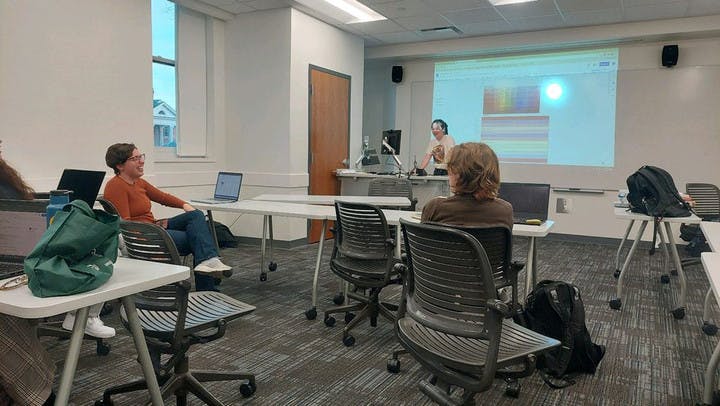During the first week of school last semester, Taylor Connelly, a freshman studying journalism, found a passion for preserving Ohio University’s history.
While on a tour for one of her HTC classes, Connelly was inspired by Tom O’Grady, an instructor of astronomy at OU, who shared an immense enthusiasm for the university’s past with students.
“I was like, ‘I feel like I need to get in on this,’” Connelly said. “I decided I want to get in on that history and try to help preserve some of it.”
The Society of Athens Preservation, or SOAP, was then born with Connelly manning the presidency. The student-run organization, whose advisor is O’Grady, has the mission “to advocate for the preservation of Athens, Ohio’s rich history through exploration, education, service and conservation,” according to SOAP’s Instagram.
Eliza Russo, a freshman studying theater and SOAP’s social media chair, said Connelly posted on Instagram a few days after the tour looking to recruit members for the new organization.
“One by one we all kind of reached out and we had our first (Microsoft) Teams call and we were like, ‘What are we even gonna do?’” Russo said.
According to the National Park Service, historic preservation “is a conversation with our past about our future.”
“We don’t just want to preserve the history that’s already here, we want to preserve the history that’s being made,” Max Baker, a freshman studying environmental studies and the vice president of SOAP, said.

Provided by Eliza Russo.
In searching through the archives at OU, Baker found a folder filled with art dedicated to the recently demolished Scott Quad, which was approved by the OU Board of Trustees in October of 2021, according to a previous Post article.
“Ohio University is really unique because of how frequently it draws back alumni and how frequently alumni come back,” Baker said. “I remember Taylor and I were in the archives at one point, and we saw this folder for Scott Quad, and it had a bunch of poems, songs, drawings, like little mascots that people have made about Scott Quad because they loved the building so much.”
Taylor Orcutt, a freshman studying journalism and the editor for SOAP, is from Athens and said the area becomes other people’s homes for however many years they decide to stay. The importance of preserving OU’s historic buildings, Ocutt also said, is centered around people’s experiences on campus.
“This is my home,” Ocutt said. “I’ve grown up around these buildings pretty much, so I appreciate the beauty they bring to campus and to the city itself. I would like them to stick around because I like them a lot.”
On SOAP’s Instagram, there are posts about the history and purpose of different buildings, either demolished or still standing, on campus and in Athens.
“We’re running a series of Instagram posts that basically focus on one building on campus,” Russo said. “We put up a post about a building that has either been demolished or is in fear of being demolished or is just a beautiful building on campus that we love.”
Connelly and Baker attended the advisory meeting for the Ridges Development Plan and want to work more with administration and OU’s Board of Trustees to help keep people up to date on those developments. According to a previous Post article, the future plan for the Ridges may include an expansion of recreational benefits, more housing options and preservation efforts.
The opportunities SOAP can provide students, Connelly said, are open-ended and creative.
“I feel like there’s so many different routes we can take,” Connelly said. “We can bolster our social media, we can get newsletters, we can do tours of buildings, we can have walking tours – so many different creative projects. I feel like people can have the opportunity to really just take this history and make it whatever they want to make it.”
SOAP currently meets every Friday at 5 p.m. in Ellis Hall room 019. For more information on how to join SOAP, people can use the organization’s Linktree.
The plans for historic buildings on campus are being monitored by members of SOAP, and while the organization’s members are advocating for preservation of history, they’re also ensuring they have a future.
“With all of the buildings that they’re either demolishing or thinking about remodeling to make it unrecognizable, you’re losing that nostalgia that people have,” Baker said. “You’re losing the history that comes with it.”






